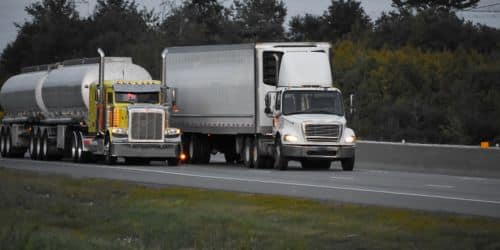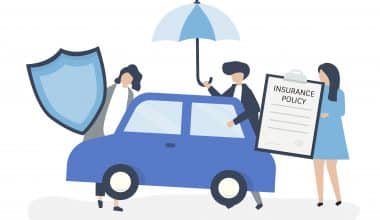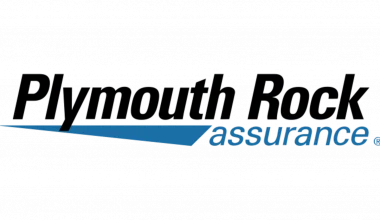You can rest easy knowing that your travel trailer insurance coverage will cover any unintentional or natural damage to your trailer, such as from a storm or flood. It also protects you from being held liable for any harm you cause to another person or their property. The insurance policy will provide financial protection for the owner if the owner or employees of the food or utility trailer cause any property damage, customer injuries, or other damages.
Trailer Insurance
Trailers are vehicles that do not have engines and are pulled behind another vehicle. There are different kinds of trailers. Some are used for business, while others are great for personal use. Trailer insurance is a form of vehicle insurance that covers the trailer’s owner in the event of property damage or bodily injury to a third party.
Trailer insurance pays for repairs after an accident or natural disaster, like a tree branch falling on it. Coverage under a trailer insurance policy extends to any vehicle that must be towed behind another car or truck. There is insurance for trailers, whether they are used for work-related hauling, moving livestock, or fun activities.
Your regular auto insurance policy does not cover damage to a trailer. As long an insured vehicle pulls the trailer, most personal auto insurance policies cover liability for trailers up to a certain weight.
Always check with your insurance company to make sure your new trailer is included in your liability coverage. If not, or if you want protections beyond the legally required minimum, you will need to insure your trailer separately.
Trailer Insurance Coverage
Insurance for a travel trailer is similar to that of a home or car, but it also provides protections that are not standard in those policies. Unlike standard homeowner’s insurance, which does not pay for flood damage, comprehensive insurance does. Your car insurance might not cover certain personal items, but if you have travel insurance, you might be covered.
Your typical travel trailer insurance policy might not cover damage due to normal wear and tear, intentional damage, or use of the vehicle in a way that is against the law, such as in a race.
What Travel Trailer Insurance Covers
#1. Liability Coverage
When you tow a travel trailer with your car, you are covered for liability under your auto policy. If you plan to spend a lot of time or live in your travel trailer, it is smart to purchase additional liability coverage in addition to your regular auto insurance. Maintaining at least liability coverage on your trailer is mandatory. The proportion of harm your trailer causes to another person or their property is covered by liability insurance.
#2. Comprehensive Coverage
In contrast to a standard policy, comprehensive insurance will cover repairs for your travel trailer if:
- Theft
- Animals
- Vandalism
- Fire
- Severe weather (including flooding)
Your trailer is protected from things like theft, vandalism, fire, and natural disasters with the help of comprehensive insurance.
#3. Collision Coverage
Like auto insurance, collision insurance protects your travel trailer if it is damaged in a collision. Any damage to your trailer that was not caused by another vehicle is covered by collision insurance. Let us say you hit a parked car with your trailer. While your liability insurance will pay for the other car’s repairs, your collision insurance will pay for your own.
Extra Coverage Options: Travel Trailer Insurance
Consider purchasing additional insurance for your travel trailer if you plan to spend a lot of time there or if it is particularly expensive.
#1. Personal Property Coverage
If you plan on hauling expensive machinery or other valuables, you should probably insure the contents of your travel trailer. In most cases, the amount of coverage for your personal belongings will be up to you.
#2. Full-Time Coverage
Consider upgrading to a homeowners policy with higher liability limits and medical payment coverage if you plan to spend a significant amount of time living in your travel trailer.
#3. Total Loss Replacement
Your travel trailer will be replaced with a similar model that is no more than five years old, depending on your insurance provider. Your insurance company might decide that it is cheaper to buy a new trailer than to fix the old one. There are still policy terms and conditions, and you have to pay back any loans that are still outstanding on the new trailer.
#4. Emergency Expense Coverage
If your travel trailer is destroyed and you have to stay elsewhere for an extended period because of the repairs, this insurance will help cover your costs.
#5. Towing and Roadside Assistance
Your company’s policy and plan will determine how far you can travel without incurring additional costs. Roadside assistance: If you have a flat tire, run out of gas, or experience any other mechanical failure, you can call your insurance company and they will send someone to help you. Take a close look at your existing auto policy to see if this is something that comes standard or can be added on.
#6. Personal Umbrella Policy
If you are ever sued and awarded damages that exceed your liability limit, this policy will pay for it. Consider a scenario in which the other party sues you for $60,000 in damages or medical expenses, but your liability cap is only $50,000. The additional $10,000 would be your responsibility if you did not have an umbrella policy. Before deciding on the level of coverage you need for your trailer, discuss your usage expectations with an insurance agent.
Travel Trailer Insurance
Insuring a travel trailer is a niche market within the insurance industry. Its purpose is to insure non-motorized travel trailers like fifth-wheels, stationary travel trailers, park model travel trailers, truck-mounted campers, and pop-up campers against unforeseen events like theft or vandalism.
Travel trailers are not covered under standard auto insurance policies, so you should purchase a separate policy or add an endorsement to your existing policy.
Travel Trailer Insurance Cost
Almost any auto insurance company will let you buy a policy. Trailer type, location, and level of coverage are just a few of the variables that can affect your monthly premium. You can get insurance for a wide variety of trailers, including pop-ups, fifth-wheels, and utility trailers. Find out what kind of insurance coverage is mandatory in your state for trailers like yours.
The annual premium for travel trailer insurance can range from several hundred to several thousand dollars, depending on several factors. Like auto insurance, travel trailer insurance rates depend on the policyholder’s personal information, such as age, driving record, the location of the trailer’s registration, and the amount of coverage purchased. Insurance for a travel trailer can cost anywhere from $250 to $500 per year, depending on the type of trailer you have and the level of protection you seek.
Cheaper Insurance Options for Trailers.
Fortunately, there are a few approaches that can lower the cost of trailer insurance.
#1. Bundle With Other Policies
Getting trailer insurance through your car insurance provider, if they offer it, could save you money. Having multiple lines of insurance with the same company can increase your savings.
#2. Ask for Discounts
If you are a loyal customer with a spotless driving record, you could save money. Asking your insurance agent about possible discounts is never a waste of time.
#3. Increase your Deductible
You will have to foot the deductible portion of any repair costs yourself before insurance will kick in. Most of the time, your annual premiums will be higher if your deductible is lower and lower if it is higher.
#4. Shop Around
Insurers frequently provide discounts to attract new customers. To make sure you are still getting the best deal on insurance, it is a good idea to compare rates every year.
Utility Trailer Insurance
To transport equipment, tools, and supplies, commercial utility trailers like these are in high demand. Businesses can safeguard their commercial utility trailers from unforeseen circumstances by purchasing commercial utility trailer insurance. Commercial utility trailer insurance protects you financially if your trailer is stolen, damaged, or found to be responsible for another person’s medical bills or property damage.
Utility trailer insurance is not mandated in most places, so you might not have given it much thought. The most important type of coverage to have in case you cause an accident while towing a trailer is liability insurance on the vehicle doing the towing.
Liability coverage is typically extended by your auto insurance policy while towing a utility trailer, but this does not include protection for the trailer’s contents or its physical condition. Trailers and their contents are not always covered by a standard auto insurance policy, especially in the event of theft or extreme weather.
Types of Commercial Utility Trailer Insurance
#1. General Liability Insurance
Commercial utility trailer insurance primarily consists of liability coverage. If you are the owner of the trailer and are responsible for an accident or injury to another person, this liability coverage will protect you financially. The insured person is reimbursed for their medical expenses and any other costs incurred as a direct result of the incident. Additionally, the policy will cover the cost of defending you in court.
#2. Professional Liability Insurance
Commercial utility trailer insurance can be supplemented with a professional liability policy if the trailer will be used to transport goods.
If customers sue you for negligence due to lost freight, missed deliveries, or late deliveries, your professional liability insurance will cover their medical expenses, legal fees, and any settlement awards.
Commercial utility trailer operations can obtain professional liability insurance with limits of $1 million per incident and $2 million in total coverage from most major insurers.
#3. Product Liability Insurance
Renting utility trailers is easier if you have product liability insurance. The renter can sue you for damages to their property or injuries caused by your utility trailer. Product liability insurance, like general liability insurance, pays for damages and costs associated with defending against those damages, such as attorney fees, settlements, and administrative costs.
Product liability insurance can be bought on its own. Most insurance providers, however, strongly advise you to add this coverage to your general liability policy.
#4. Commercial Property Insurance
To safeguard your utility trailer company’s building and trailer fleet, invest in commercial property insurance. In addition to office furniture, computers, and generators will be protected as well.
If your utility trailer company’s building is destroyed or damaged as a result of:
- Fire
- Theft
- Vandalism
- Malicious mischief
- Sinkhole collapse
- Volcanic action
- Hail
- Snow
- Winds
- Aircraft
- Vehicle Impact
- Sprinkler leakage
#5. Worker’s Compensation Insurance
Employees will be part of your utility trailer company. After all, somebody has to handle things like utility trailer upkeep, financial management, and customer service. If an employee is hurt on the job, they have the right to seek compensation from you.
Getting workers’ compensation insurance can help you meet this obligation without draining your company’s resources. Keep in mind that your utility trailer company can only use workers’ compensation insurance for full- or part-time employees who sustain injuries or illnesses while on the job.
#6. Theft Coverage Insurance
If your utility trailer is stolen, do not worry about paying to fix it because the theft insurance will cover it. If your utility trailer is stolen and not recovered, this policy will pay for a new one.
Theft insurance for utility trailers can be purchased with either a replacement cost or an actual cash value stipulation. If your utility trailer is stolen or damaged beyond repair, you can claim compensation through an actual cash value theft insurance policy. However, if you have utility trailer theft coverage, you will be compensated and able to purchase a new trailer.
#7. Collision Coverage
Collision insurance will cover the costs associated with repairing your trailer after an accident in which it collides with another vehicle, object, or piece of infrastructure (including a rollover).
#8. Comprehensive Coverage
If you have comprehensive insurance, you will not have to worry about paying for repairs if something bad happens to your car that was not a collision. Theft or vandalism can occur while you are working even if your utility trailer is safe at your house or business. Wildfires and other natural disasters, as well as extreme weather, can cause significant damage to machinery. If something bad happens, full coverage has your back.
#9. Equipment and Tools
You should get towing insurance if you frequently transport expensive items like lawnmowers, tractors, ATVs, and other farm machinery. What you are transporting will determine the type of coverage you need.
#10. Commercial Auto Policy
For non-commercial purposes, a personal auto policy will cover a utility trailer. If you use a utility trailer for your business, you need commercial vehicle insurance. A commercial auto policy will cover the car that is pulling the trailer. Insurance covers both the car and the trailer.
Utility Trailer Insurance Cost
Many variables go into determining how much it costs to insure a utility trailer. The insurance agent from the company you choose will usually look at the type and make of the utility trailer, how many miles it travels each year, and what it is mostly used for to come up with your personalized rates. These latter factors also change with the quantity and nature of the trailer’s cargo.
Trailer weight and the nature of the cargo affect pricing as well. A good number of insurance companies offer discounts to drivers over the age of 25 who also hold a valid commercial driver’s license. It is possible that trailers used in less dangerous areas, such as those with fewer accidents, could qualify for price reductions or other incentives.
Food Trailer Insurance
Simply put, a food trailer is a mobile restaurant. Typically, the trailer will have utensils and food for cooking. Food trucks are stationary businesses, despite being pulled by motor vehicles. Food truck insurance is mandatory for food trucks.
If you own a food truck or trailer, you should get insurance for it. A food trailer endorsement is a type of insurance policy that specifically covers mobile kitchens. It will typically protect you from legal action stemming from incidents that take place on your trailer and will include liability coverages. Commercial auto insurance is required to cover damage to your trailer while in transit.
When your food trailer is not attached to your vehicle but instead parked at an event or place of business, it is vulnerable to damage. Insurance for your food truck can help pay for damages if someone gets hurt while eating there.
If you do not have insurance for your food trailer, a single claim could wipe out your business. If you own a restaurant, you need both general liability insurance and product liability insurance in case your customers or employees get hurt or sick.
Types of Food Trailer Insurance
#1. General Liability
Protect your food truck business from lawsuits alleging it is responsible for someone else’s injuries or property damage by purchasing general liability insurance. A customer could sue you for damages if they trip over an extension cord you left lying around your trailer. You can avoid having to pay for damages like these with General Liability insurance. You can protect your food truck business from lawsuits alleging injuries or damage to customers or their property by purchasing general liability insurance.
#2. Product Liability
One of the worst possible outcomes of working with food is getting sick from it. Claims, such as those for food poisoning, can be common but difficult to avoid. Getting product liability insurance will protect your company in case someone makes a claim like this.
#3. Tools and Equipment
Coverage from inland marine insurance extends to appliances like refrigerators, deep fryers, and generators. If something happens to your generator or deep fryer that you could not have prevented, like bad weather or theft, you may be able to get your money back.
#4. Workers Compensation Insurance
Should an employee become injured or ill as a result of their work, this will pay for their medical care, time off work, and any other financial losses they may incur. Even if you only have one employee, workers’ compensation insurance is a legal requirement in most states.
#5. Commercial Property Insurance
The insurance will cover the cost of any repairs or replacements if an insured peril, such as a fire or a tornado, damages your company’s building or equipment. Should a fire break out in the office, commercial property insurance would pay to replace everything lost, including computers, furniture, tools, inventory, supplies, valuable papers, and business records.
#6. Commercial Auto Insurance for Food Trailers
You can rest easy knowing that commercial auto insurance will cover any potential damage to your food truck. Additionally, it can help pay for medical bills and property repairs if the food truck is at fault in an accident. Coverage for commercial vehicles typically includes the following:
- Auto liability
- Physical damage
- Emergency roadside assistance
Food Trailer Insurance Cost
Because each food trailer business is different, insurance companies will work with you to come up with a policy and premium that works for you and your business. The amount you pay in premiums will vary from one insurance provider to the next.
Different types of food, different types of equipment, different locations, and different types of coverage all contribute to a different food truck insurance premium. Commercial auto insurance quotes can be as expensive as personal policies if you do not shop around.
Insurance for a food truck can cost anywhere from $299 to $500, depending on the level of protection you require, your geographic location, and the insurance provider you select. For some reason, those rates do not include additional coverages that you might need, like liquor liability insurance. The most reliable method for estimating cost is to request a personalized quote.
Where Can I Get Insurance for My Trailer?
You can choose from a wide variety of insurance providers if you need protection for a travel trailer or utility trailer. You can buy trailer insurance from your regular auto insurer or a commercial one; all you have to do is give them a call and ask.
What Kind of Insurance Do You Put on a Trailer?
You should at least get liability insurance for your trailer. Liability insurance pays for the portion of harm that your trailer causes to people or property.
Is Travel Trailer Insurance Worth It?
Whether or not your lender or the law requires it, getting insurance for your travel trailer is a smart move. It is important to have RV insurance in case of an accident so that you are not responsible for paying for repairs or replacement out of pocket.
Does Alabama Require Utility Trailer Insurance?
While trailer insurance is not required by law, it is a good idea to have it. You should insure the trailer and its contents if they are worth a significant amount to you in case of an accident, theft, or other loss.
What Does Full Coverage Insurance for a Travel Trailer Include?
Theft, vandalism, fire, glass breakage, bad weather, animal collisions, and other unavoidable mishaps are all covered by comprehensive insurance for your recreational vehicle. It does not matter who was at fault; if your RV crashes into something else, your collision coverage will pay to fix or replace it and protect your investment.
Your full coverage insurance will pay to fix any damage that occurs to your travel trailer while it is not being towed. This includes things like a fire, a storm, theft, vandalism, flooding, or hail. This also includes Animal collisions.
Do Trailers Need Inspection in Texas?
Every year, any trailer with a gross weight over 4,500 pounds must pass a safety inspection. To pass these checks, the trailer’s owner may need to submit photos and a weight certification.
Does Camper Insurance Cover Water Damage?
Full-coverage If something happens to your recreational vehicle and it was not your fault, your insurance will cover the repairs. A policy with comprehensive coverage will pay for damage from fire, hail, and water. It’s still worth checking with your insurer for exclusions
Which Companies Insure Travel Trailers?
These are some of the biggest companies that sell full coverage insurance for travel trailers. Find out the cost of insuring your trailer by contacting an insurance agent or one of these businesses.
- Farmers
- GEICO
- Progressive
- The Hartford
Conclusion
Trailer insurance shields you from financial loss in the event of an accident, theft, fire, vandalism, or natural disaster involving your trailer. Additional coverage can be purchased as needed, with options varying by trailer type, purpose, and manufacturer.
Knowing how often and where you will be using your trailer will help your insurance agent determine the best policy to protect your investment. Be sure to protect whatever is being transported in the RV as well.
- FOOD TRUCK INSURANCE: Coverage, Types and Cost
- Property Damage Liability Insurance: Protect Yourself from Financial Loss
- Cheap Small Business Insurance: Best of 2023
- Commercial Truck Insurance Companies: Top 7 Best in 2023
- CARPENTER INSURANCE: What Is It, Who Needs It & Why?






